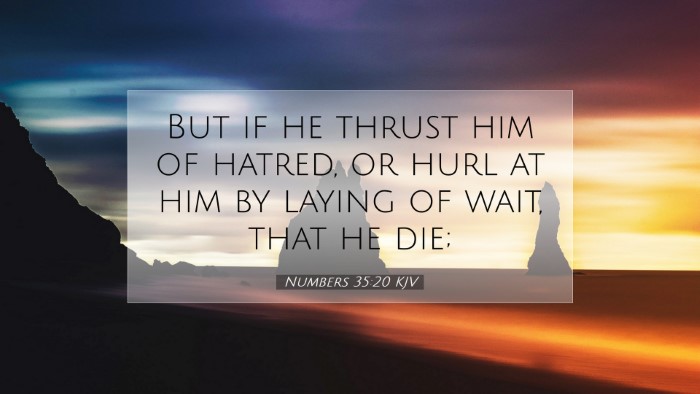Commentary on Numbers 35:20
Bible Verse: "But if he thrust him of hatred, or hurled at him by laying of wait, that he die;" (Numbers 35:20, KJV)
Introduction
This verse is part of the laws given concerning cities of refuge, emphasizing God's provision for justice and mercy. In this section, we explore the implications of the act of murder in contrast with accidental killing, and how this reflects God's character and the nature of human accountability.
The Context of the Passage
Numbers 35 is located within the broader narrative of Israel's wilderness wanderings and the establishment of societal laws after the Exodus. Here, the cities of refuge serve as a critical framework for managing justice amidst a community. Understanding the nature of intentional versus unintentional acts is paramount for any study of this text.
Significance of Cities of Refuge
These cities were instituted for the protection of those who committed unintentional homicide. The distinction made in this verse is crucial: it differentiates between premeditated acts and those resulting from accidents. This establishes a foundational principle of justice that differentiates culpability based on intent.
Analysis of Key Terms
Thrust of Hatred
Matthew Henry emphasizes that "thrust" implies a violent act borne out of malice. The language suggests deliberate intent, thus constituting murder. Acts of hatred lead to severe consequences not only here but as a broader moral principle in Scripture, linking to New Testament teachings about anger and intent (see Matthew 5:21-22).
Laid in Wait
Albert Barnes notes that "laying in wait" indicates premeditation and a calculated approach to kill someone, which is a grave offense in the sight of God. Such actions violate the core tenets of loving one’s neighbor and reflect a departure from a covenantal relationship centered on justice and mercy.
Theological Reflections
This verse serves as a reminder of God's justice. The very necessity for cities of refuge shows that while God is merciful, He is also just. Adam Clarke points out that divine governance includes safeguarding society from evil and endorsing protection for those who have made grievous mistakes without malicious intent.
God’s Justice and Mercy
The dual emphasis on justice for murder and mercy for the manslayer draws a profound theological distinction. It illustrates God's desire for order and righteousness within the community while also providing a means of protection and a chance for rehabilitation for those who commit unintentional sins. This reflects the broader redemptive narrative found throughout the Scriptures.
Practical Applications for Ministry
For pastors and church leaders, this verse can serve as a jumping-off point for discussions around justice, mercy, and the nature of sin. The careful distinctions made in the Old Testament law inform pastoral care, particularly in how we approach sin within our communities.
Justice in the Church
- Educating the Congregation: Teach about the weight of intentionality in actions and the serious consequences of hatred and premeditated sin.
- Creating Safe Spaces: Establish mechanisms within the church for those who have caused harm to find restoration, mirroring the cities of refuge.
- Addressing Anger and Hatred: Preach on the dangers of harboring hatred, urging congregants to seek reconciliation before it leads to irreversible harm.
Conclusion
Numbers 35:20 represents a significant snippet of legal, pastoral, and theological reflection for believers today. Understanding the nature of intentional versus unintentional actions is a reminder of the importance of approaching justice and mercy with both seriousness and grace. Both in the historical context of Israel and in the contemporary church, these principles endure and provide guidance for the faithful.
References from Commentaries
- Henry, Matthew. "Commentary on the Whole Bible." Volume 1: Old Testament.
- Barnes, Albert. "Notes on the Old Testament." Numbers.
- Clarke, Adam. "Clarke's Commentary on the Bible." Joshua to 2 Samuel.


